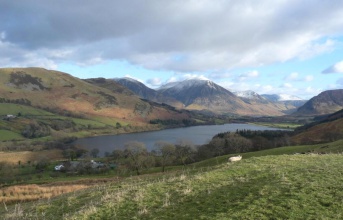Case study:Improving water quality in Loweswater: Difference between revisions
Jump to navigation
Jump to search
No edit summary |
No edit summary |
||
| (10 intermediate revisions by 2 users not shown) | |||
| Line 1: | Line 1: | ||
{{ | {{Case study status | ||
|Approval status= | |Approval status=Approved | ||
}} | }} | ||
{{Location | {{Location | ||
| Line 16: | Line 9: | ||
|Themes=Economic aspects, Habitat and biodiversity, Social benefits, Water quality | |Themes=Economic aspects, Habitat and biodiversity, Social benefits, Water quality | ||
|Country=England | |Country=England | ||
|Main contact forename= | |Main contact forename=Vikki | ||
|Main contact surname= | |Main contact surname=Salas | ||
|Contact organisation=West Cumbria Rivers Trust | |Contact organisation=West Cumbria Rivers Trust | ||
|Contact organisation url=westcumbriariverstrust.org/ | |||
|Partner organisations=National Trust, Environment Agency, Natural England, Centre for Ecology & Hydrology | |||
|Multi-site=No | |Multi-site=No | ||
|Project picture=Loweswater.jpg | |||
|Project summary=To ensure that Loweswater achieves good ecological status under the WFD, diffuse pollution will be reduced through changes to farming practices and restoration of tributaries, and methods will be trialled to reduce algal populations within the lake including ultrasound and wind-powered aerating and mixing equipment. | |Project summary=To ensure that Loweswater achieves good ecological status under the WFD, diffuse pollution will be reduced through changes to farming practices and restoration of tributaries, and methods will be trialled to reduce algal populations within the lake including ultrasound and wind-powered aerating and mixing equipment. | ||
The project is ongoing thanks to funding from the National Trust to allow continued monitoring of the site. | |||
}} | }} | ||
{{Image_gallery}} | {{Image_gallery}} | ||
| Line 30: | Line 28: | ||
}} | }} | ||
{{Site | {{Site | ||
|WFD water body code=GB31228986 | |||
|WFD water body name=Loweswater | |||
|Heavily modified water body=No | |||
|Protected species present=No | |||
|WFD water body code= | |Invasive species present=No | ||
|WFD water body name= | |||
|Heavily modified water body= | |||
|Protected species present= | |||
|Invasive species present= | |||
}} | }} | ||
{{Project background | {{Project background | ||
|Funding sources=Defra Catchment Restoration Fund | |Project started=2012/07/01 | ||
|Total cost category=100 - 500 k€ | |||
|Total1 cost=427 | |||
|Funding sources=Defra Catchment Restoration Fund, National Trust | |||
}} | }} | ||
{{Motivations | {{Motivations | ||
Latest revision as of 13:16, 6 June 2017
Location: 54° 34' 59.62" N, 3° 21' 24.07" W
Left click to look around in the map, and use the wheel of your mouse to zoom in and out.
Project overview
| Status | In progress |
|---|---|
| Project web site | |
| Themes | Economic aspects, Habitat and biodiversity, Social benefits, Water quality |
| Country | England |
| Main contact forename | Vikki |
| Main contact surname | Salas |
| Main contact user ID | |
| Contact organisation | West Cumbria Rivers Trust |
| Contact organisation web site | http://westcumbriariverstrust.org/ |
| Partner organisations | National Trust, Environment Agency, Natural England, Centre for Ecology & Hydrology |
| Parent multi-site project | |
| This is a parent project encompassing the following projects |
No |
Project summary
Edit project overview to modify the project summary.
To ensure that Loweswater achieves good ecological status under the WFD, diffuse pollution will be reduced through changes to farming practices and restoration of tributaries, and methods will be trialled to reduce algal populations within the lake including ultrasound and wind-powered aerating and mixing equipment.
The project is ongoing thanks to funding from the National Trust to allow continued monitoring of the site.
Monitoring surveys and results
This case study hasn’t got any Monitoring survey and results, you can add some by editing the project overview.
Lessons learnt
This case study hasn’t got any lessons learnt, you can add some by editing the project overview.
Image gallery
|
Catchment and subcatchmentSelect a catchment/subcatchment
Catchment
Subcatchment
Site
Project background
Cost for project phases
Reasons for river restoration
Measures
MonitoringHydromorphological quality elements
Biological quality elements
Physico-chemical quality elements
Any other monitoring, e.g. social, economic
Monitoring documents
Additional documents and videos
Additional links and references
Supplementary InformationEdit Supplementary Information
| ||||||||||||||||||||||||||||||||||||||||||||||||||||||||||||||||||||||||||||||||||||||||||||||||||||||||||||||||||||||||||||||||||||||||||||||||||||||||||||||||||||||||||||||||||||||||||||||||||||||||

